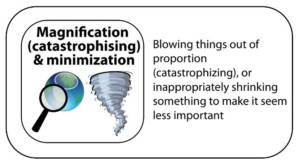I hosted a follow up call and heard about amazing progress from the members of the Getting Over StageFright workshop group this past September – such as volunteering to speak in front of an auditorium size audience, giving impromptu talks/training and presentations in new environments.
Instead of realizing what major accomplishments these are, they were preoccupied with thoughts like: “I shouldn’t have felt that nervous at that point in my presentation”, “I was probably rambling and incoherent”, etc.
I asked them to think back to before the workshop; would they have ever imagined saying yes to these once greatly feared situations? Never mind following through and doing so well!
By the end of the call, I heightened their awareness of the negative thought patterns and requested they stop minimizing their accomplishments and start celebrating them more! The member who gave the auditorium size speech hadn’t even thought to celebrate.
Do you give yourself credit for simply saying yes to something you would have done anything to avoid before?
This very first step is the most crucial as well as the most overlooked!
What’s going on here?
Psychologists define “cognitive distortions” as a collection of negative thought patterns that can often become habitual beliefs. These self-defeating thoughts drive our perspective through common distortions such all-or-nothing thinking (seeing things as good or bad, with no in-between). Cognitive distortions are at the core of what many cognitive-behavioral and other kinds of therapists use to form healthier thought patterns in their clients.
Example of a Magnification and Minimization Cognitive Distortion:
Kim had rehearsed a speech for her sister’s wedding. When it came time to make her toast, though, Kim blundered a couple of words. She quickly regained control and ended up giving a moving and heartfelt toast. Afterward, many people complimented her on her speech. However, Kim complained that she was embarrassed by her slip-ups and felt that she had ultimately ruined this special occasion for her sister.
Kim is magnifying her flaws and minimizing her accomplishment. If Kim were thinking more realistically, she would recognize that most people enjoyed her speech and did not even notice the small imperfections. Her mistakes actually may have made her toast sound even more genuine and sincere. Kim likely missed out on the fun of this wonderful event by focusing too much on the few errors that occurred in her speech.
Another example here.
Do you want worksheets of all the cognitive distortions, including a thought pattern tracking sheet?
Get them here: http://bit.ly/CognitiveDistortionsSheets
2019 Workshop Dates:
MARCH 2-3,
APRIL 13-14,
JULY 20-21,
SEPTEMBER 14-15,
NOVEMBER 2-3
More workshop info here.




